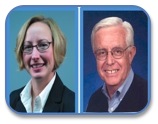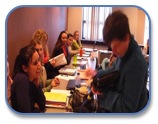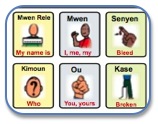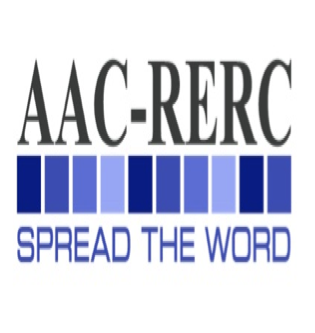Evidence-based literacy intervention for individuals who require AAC. J. Light, Pennsylvania Speech and Hearing Association, State College, PA. Thu. Apr 8th, 2010,
Evidence-based literacy intervention for individuals with autism spectrum disorders who require AAC. J. Light & D. McNaughton, National Autism Conference, State College, PA. Wed. Aug 4th, 2010,
|
 |
In this new, free, webcast, Susan Fager (Madonna Rehabilitation Hospital) and David Beukelman (University of Nebraska) describe AAC interventions for individuals with minimal movement (e.g., brainstem stroke, amyotrophic lateral sclerosis, Guillan Barre’ Syndrome, and chronic myasthenia gravis). It provides research results (including video files) from an ongoing investigation of the impact of a new generation of AAC technology.
|
|
Tech Watch Blog
The Tech Watch blog, developed and maintained by Jeff Higginbotham (University of Buffalo), disseminates information on new technology research and devices relevant to the AAC community.
|
|
Transition Strategies for Adolescents and Young Adults who use AAC
This edited volume by David McNaughton and David Beukelman describes transition strategies to support employment, community living, post-secondary education, and other desired outcomes for youg adults who use AAC. The book features contributions by Anthony Arnold, Sue Balandin, Barbara Collier, Beth Foley, Pamela Kennedy, Lateef McLeod, Tracy Rackensperger, Michael Wehmeyer, and others.
|
|
ACES: Augmentative Communication and Empowerment Supports
ACES, a nationally and internationally recognized program for individuals who use AAC devices will be held from July 6 - July 17, 2010, at Temple University in Philadelphia, PA. AAC users will receive 2 weeks of intensive instruction on skills needed for transition from high school to adult life, plus 1 year of follow-along services.
|
| |
In this reprint from the September 2009 issue of Exceptional Parent magazine, Lew Golinker (Attorney and AAC Funding Advocate) describes funding sources for AAC technology.
|
| |
This edited volume by David Beukelman, Kathryn Garrett, and Kathryn Yorkston features chapters on AAC services for adults with chronic medical conditions such as ALS, aphasia, and traumatic brain injury. It includes contributions from Laura Ball, Michelle Bourgeois, John Costello, Delva Culp, Molly Doyle, Susan Fager, Melanie Fried-Oken, Julia King, Joanne Lasker, and others.
|
|
Speech and Language Processing for Assistive Technologies
Melanie Fried-Oken (Oregon Health and Science University), Kathleen McCoy, and Brian Roark are helping to organize a workshop on speech and language processing for assistive technologies, to be held as part of NAACL HLT 2010. Details, including a call for papers, can be found here.
|
| |
Early intervention for young children with autism, cerebral palsy, Down syndrome, and other disabilities
This website provides guidelines for early intervention to maximize the language and communication development of young children with complex communication needs.
|
 |
AAC class at the University of Rhode Island
Diane Bryen (Temple University), with the assistance of individuals who use AAC like ACES graduate Hannah Rosenbaum, taught a week long graduate class in AAC at the University of Rhode Island.
|
 |
Emergency Communication 4 ALL—Picture Communication Aid
In response to the humanitarian crisis in Haiti, Diane Bryen and other volunteers have translated the Emergency Communication 4 ALL—Picture Communication Aid into creole. It is available for free download.
|
Recent Presentations and Publications
|
McNaughton, D., & Light, J. (January, 2010). Teaching literacy skills to individuals with complex communication needs. Assistive Technology Industry Association (ATIA), Orlando, FL. (website)
Fager, S. & Jakobs, T. (January, 2010). Supporting communication of individuals with minimal movement. Assistive Technology Industry Association (ATIA), Orlando, FL (webcast)
Curtis, T. & McBride, D. (January, 2010). The ACES module: Augmentative Communication Evaluations Simplified. Assistive Technology Industry Association (ATIA), Orlando, FL
M. Fried-Oken (February, 2010). AAC for adults with acquired communication impairments. Hilton Hotel, Vancouver, WA.
DeRuyter, F. & Shane, H. (March, 2010). Emerging developments in augmentative and alternative communication.
25th Annual International Technology and Persons with Disabilities Conference, Northridge, CA.
Higginbotham, J. (March, 2010). Viewing AAC through authentic social interactions. 25th Annual International Technology and Persons with Disabilities Conference, Northridge, CA
|





![]()